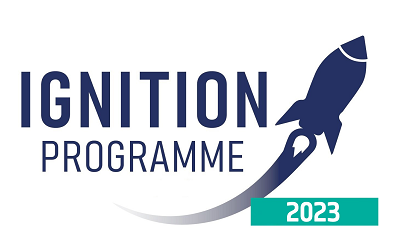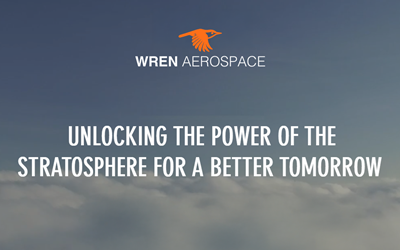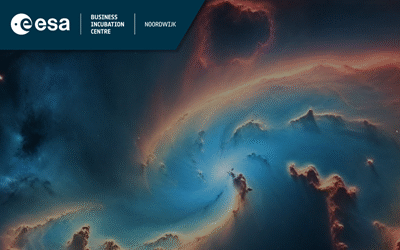Space debris is an ever-increasing problem that threatens the sustainability of space exploration as orbital congestion increases exponentially. Satellite operators receive a huge amount of collision warning alerts, even though the chance of a direct hit is low. Ecosmic has come up with a solution that will drastically reduce the amount of work needed to process false alerts. By using an innovative method to accurately predict collision probabilities between space objects, this startup has a vision for a holistic approach to space traffic operations that starts with SAFE, the System to Avoid Fatal Events.
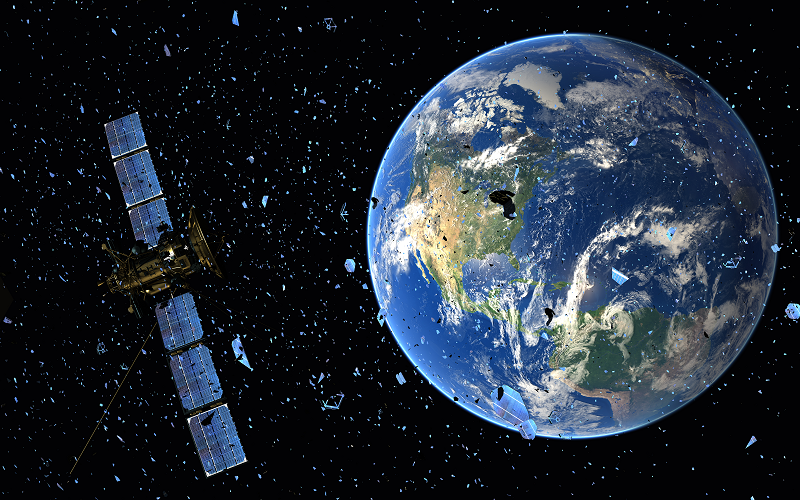
There are thought to be 36,500 items of space junk greater than 10 cm orbiting the Earth – and these are only the pieces that can be tracked; there are hundreds of thousands more smaller pieces floating around as hazards to satellites. The high risk of collision of debris with satellites lends an urgency to new initiatives that enable sustainable space practices. This includes the world’s first rating system for assessing a mission’s level of sustainability and the recent publication of enhanced guidelines covering collision avoidance manoeuvres, together with other policies and incentives. However, current tools for predicting when and where space debris will impact satellites can result in high numbers of false alerts and so new technologies are urgently required to avoid over-estimation of the collision risk.
The innovative product from Ecosmic will be a welcome addition to the market. SAFE enables a reduction in satellite downtime by offering automated and enhanced collision avoidance capabilities. The software is seventy percent more accurate than existing methods and proposes avoidance manoeuvres that will ensure faster decision making. The startup was founded when Benedetta Cattani (CEO and CTO) and Gaia Roncalli (COO) began working with Mireia Leon Dasi (author of the algorithm that forms the basis of the software methodology) while studying for their Master’s degrees in aerospace engineering at TU Delft. Ecosmic has expanded since then and now also includes Imane Marouf (CCO), Sacha Berna (graphic design and media manager) and Salvatore Vicinanza (technical officer), plus Yurij Pettinari and Sean Cowan (GNC engineers). Since joining the Dutch business incubation programme of the European Space Agency at ESA BIC Noordwijk in March 2023, the team has hit the ground running. We caught up with Benedetta and Gaia to find out about the startup’s aspirations for space sustainability.
What is the focus of Ecosmic?
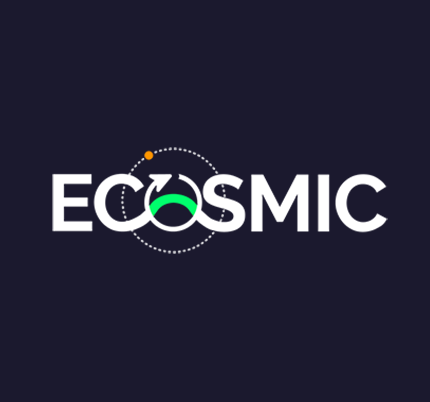
Benedetta: The goal of Ecosmic is to make space operations safer and more sustainable. We are currently focusing on space situational awareness and space traffic management with our first product SAFE, which stands System to Avoid Fatal Events. This is a software that allows us to estimate the collision probability between space objects with higher accuracy than the industry standard software that is currently used. This means that we would be able to filter out a lot of false alerts that the space operators receive nowadays, drastically reducing their workload.
What was your route to ESA BIC?
Gaia: Since we work in the space sector, for all of us, working at the European Space Agency has always been a dream. So, we all applied for internship there – in fact many of our team members had work or internship experiences at ESA – and so we knew already about ESA BIC from that time and as a business working in the space sector as well, it’s of course important to get the recognition of being part of an ESA business incubator. Part of the team met during our time at TU Delft, when we were studying for our Master’s degrees, and Benedetta met Sacha and Imane at ESA while they were doing their internships there. So, the focus points where we all met were either TU Delft or ESA.
How will your product SAFE be progressed during incubation?
Gaia: We have two goals during our time at ESA BIC in terms of product development. So for SAFE, the algorithm is already done and validated with real-life collision scenarios. We want to add some more features and our new GNC engineers will develop those features and add to the existing software. In the next few months, we will build the front and back ends – so, basically everything that is needed to allow us to commercialise the product so it can be used from the ground, which is our first main goal. We are developing an online user interface and, through a plug-in, customers will receive collision warnings directly to their computers or phones. The second goal, which we’re already working on, is to be able to embed the software on board of a satellite. We will do the tests that are needed in order to see what the performance of the software can be if it’s embedded on board of a satellite.
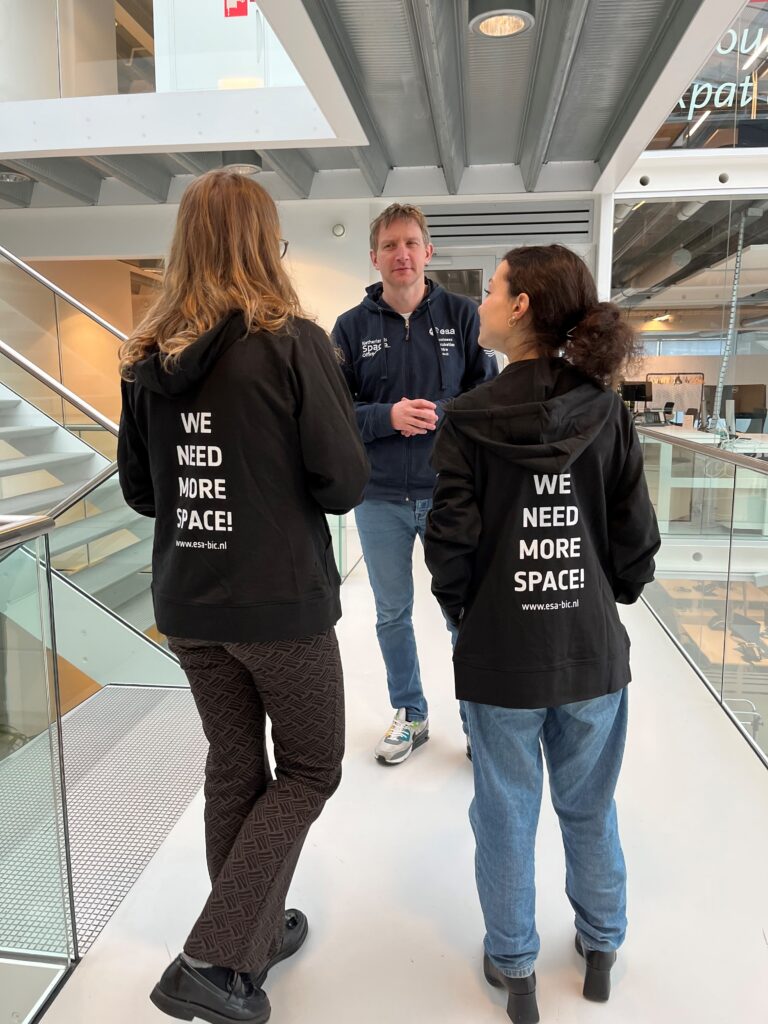
What will you first prototype look like?
Gaia: The idea for the demo is to have a dashboard where information from the satellite that the operators are managing will be inserted – such as, information about the position and velocity of the satellite, as well as associated uncertainties, etc. – and then the output will be the probability of collision and eventually the collision warnings. That is what we’re working on already. When we have the new functionality for our software, which is the suggestion for collision avoidance manoeuvres, then we’ll also add that to the dashboard so the information would be available for satellite operators. That’s our second step.
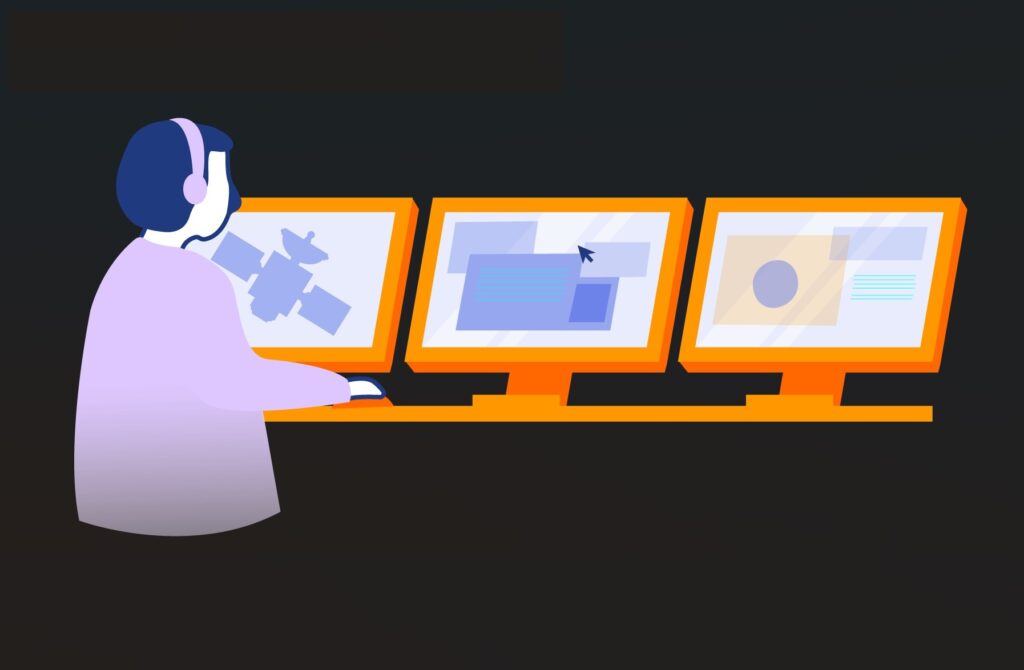
About the product: SAFE is a validated software that features innovative techniques and that allows satellite operators to make more informed decisions about possible collision avoidance manoeuvres. A plug-in for ground-based flight dynamics software, it can be accessed through a platform or integrated into a satellite. The innovation of the software comes from the mathematical models. SAFE has undergone successful novelty research that proved it is a new technique. In terms of performance, it has been compared to the industry standard and the calculation of the probability of collision is seventy percent more accurate than the industry standard. ecosmic.space/services
Can you share the key benefits of being in ESA BIC for Ecosmic?
Gaia: What is important for us is the access to ESA. We look forward to working with the coach from ESA and receiving the ESA technical support – so in that case, it’s more about the technical expertise that we will need throughout the duration of our incubation. The interest for us in selecting a coach was to have someone who knows how ESA is collaborating with commercial companies, with startups and what are the processes for early-stage startups to begin codeveloping or collaborating with ESA.
What other aspects of the programme do you find useful?
Gaia: Access to the full range of expertise and contacts is great – so, for instance, getting opportunities to pitch and network at the events that are organised. We have already met really interesting people from the industry, such as from Airbus and other companies. During the Entrepreneurs Coffee (a monthly meet-up of all the current ESA BIC startups) you can really say what your challenges are and find out who you can contact to get help – Martijn (Leinweber, the ESA BIC programme manager) always manages to find a way to introduce us to various companies or to enable us to participate in some events, so that’s really cool. The business side is also very important as we didn’t study economy or venture financing, so the business and sales workshops were really useful. Of course, having the community around and being able to talk with the other entrepreneurs is really important, even to discuss administrative matters and these little issues that every startup can have at the beginning. Being in this community really helps a lot and we really value this aspect of the programme.
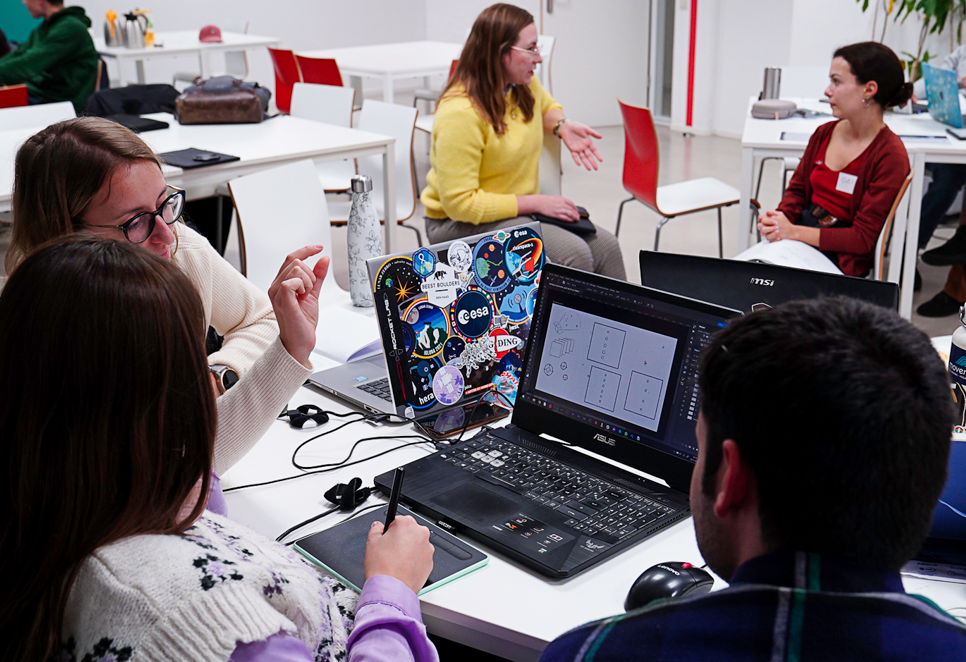
How do you go about introducing Ecosmic to new audiences?
Gaia: It is great to go to a whole range of events and have the chance to pitch. In general, we always manage to find, if not potential customers, then people who are experts in the sector and can give us interesting information and feedback – it’s true that we are looking for customers but it’s also true that market validation is a continuous process. At our recent pitch, there were two companies in the audience that are satellite operations companies, so potential customers, and we got to talk to them for a few hours and really got to have a deep-dive with them, which was great. Basically, that’s why we’re pitching so much. We want to make Ecosmic more well known in the sector and it’s also a way for us to be introduced to people.
Benedetta: Maybe in the room there is not always our perfect customer or investor or expert, but I think it’s important for a startup like ours to get ourselves out there and for people to know us – so that when they hear about someone looking for a service like ours, we are the first to pop up in their mind.
You are also grabbing the attention of competition judges – which awards have you won so far?
Benedetta: Yes, that has been going quite well. So, in 2020, the first award we ever won was the Italian Space Startup Competition back in those days when it was only me and Gaia in the team. More recently, we won the Dutch prize at the 2022 edition of ActInSpace and at the grand final in Cannes, Ecosmic was awarded the EBAN Space Women Entrepreneurship Prize. Then in Brussels earlier this year, we were presented with first prize of T-TeC, the Telespazio and Leonardo Open Innovation contest.
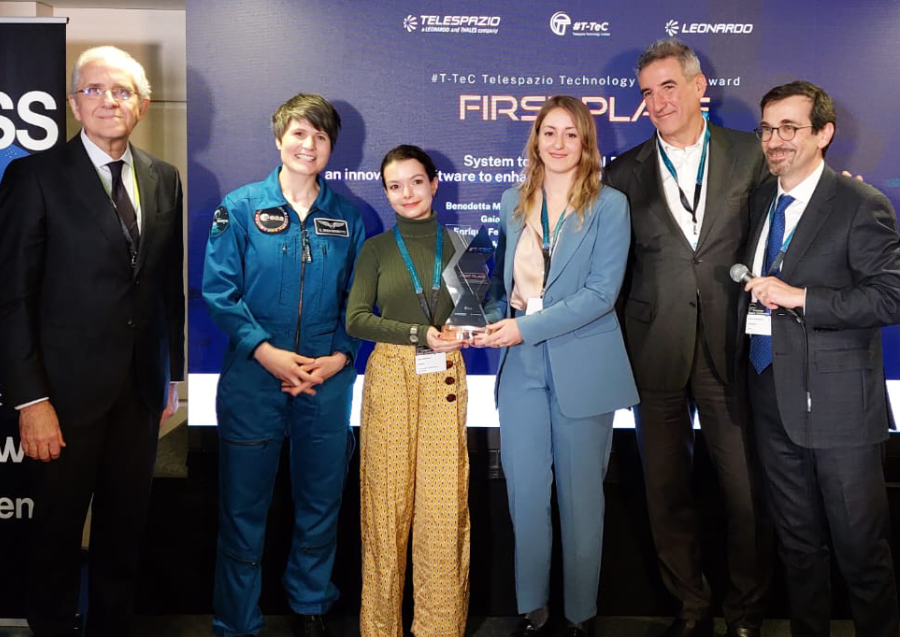
It is important for a startup like ours to get out there and for people to know us – so that when they hear about someone looking for a service like ours, we are the first to pop up in their mind
Benedetta Margrethe Cattani
How do you deal with your team being spread between France, Italy, Luxembourg and the Netherlands?
Gaia: We organise Ecosmic retreats every 3 months where we all meet in one place to make sure that there are moments to be together as a team. Currently, we are working on the software and it’s not needed for all of us to be together all the time. We do have plans to grow the team but currently most of us are not working full-time for Ecosmic yet and that means it is not possible for everybody to move to the Netherlands. In the short term, we plan to keep things as we have them now – with myself and Benedetta working from SBIC Noordwijk every week and getting the whole team together for a Dutch meet-up soon. Of course, in the future, it would be great to have more people in the team in the Netherlands and be together in person more often, so let’s see how fast we grow.
Did you take part in any pre-incubation programmes?
Gaia: Yes, first we started by being part of the Aerospace Innovation Hub inside TU Delft. Then, we also did SBIC’s Ignition Programme, which was great. And the one that lasted the longest (6 months) and was very tailored to our needs was the Impact Studio inside TU Delft (after winning the Impact Contest Golden Ticket), which introduced us to amazing business coaches. We also got into the Space Hubs Network from our involvement in the Ignition Programme because it was advertised while we were there.
Would you recommend doing the SBIC Ignition Programme prior to applying to ESA BIC?
Gaia: Yes. For us it was useful and the key part of the Ignition Programme was the market validation workshop. When you’re very early stage, you’re still potentially assessing if you have a market and what your customers will really need – plus, we were also recommended to read The Mom Test. That was like a turning point for us because it made our market validation process and the interviews that we conducted with potential customers so much better. So, definitely we got a lot out of it and it also helped us then with the ESA BIC application.
What are your future ambitions for the company?
Gaia: Our long-term vision is to produce a software suite for satellite operators to help them in mission planning, not just space traffic management. Right now, we are focusing on SAFE, of course, and on embedding it on board of satellites, but in the long term we want to have the satellite operations as a subsystem embedded inside the satellite. So, our idea is to be able to have full automation when it comes to satellite operations. Our focus is to stay a software company and produce more products that are always software and not produce hardware. The target is going to remain satellite operations which account for up to thirty percent of the cost of a space mission. So, it’s quite a big market.
Finally, do you have words of encouragement for anyone considering applying to ESA BIC Noordwijk?
Benedetta: I would say ESA is really a centre of excellence when it comes to space technology – so if that’s not a good enough reason, I don’t know what is. Also, the business development side where you can be supported – through the mentors and coaches – with ESA on the doorstep, is a unique aspect of this ESA BIC.
ABOUT ECOSMIC
Ecosmic is tackling the space debris issue by developing plug-n-play cutting-edge technology that will enhance the collision avoidance process, allowing space operators to save both in terms of costs and time. The team is passionate about sustainability and embedding sustainable operations in space missions. Ecosmic is incubated at ESA BIC Noordwijk in the Netherlands. ecosmic.space
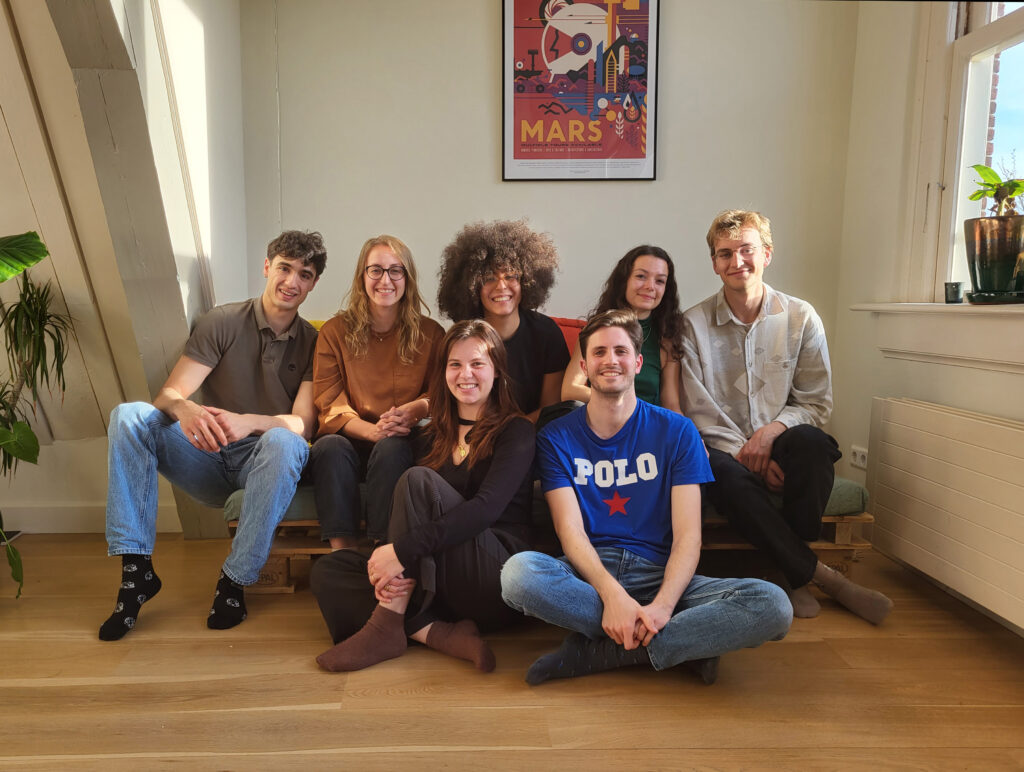
“The most useful part of the Ignition Programme is the market validation workshop. When you’re very early stage, you’re still potentially assessing if you have a market and what your customers will really need. That was like a turning point for us because it made our market validation process so much better (also: read The Mom Test).”
GAIA RONCALLI
Apply for the Ignition Programme by 21 May and you can then apply to ESA BIC in Sep 2023!
DID YOU KNOW: The Ignition Programme allows you to validate your space business plan and focuses you in order to apply for ESA BIC; eight recent startups all took part and then went on to be incubated!
